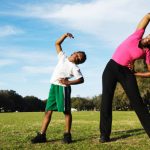According to the World Health Organisation, health is defined as “the state of being well both physically and mentally”. Health relates to a person’s entire physical, social, psychological and mental being even in the face of disease or illness. Well-being is the human state of being comfortable, healthy and happy and involves the positive feelings a person experiences in their life and amongst their environment when their needs are realised.
The factors that affect a person’s health and well-being include physical activity, diet, sleep quality, social interactions and relationships, self-esteem, self-worth, finances, work/employment and housing/accommodation.
Exercising is extremely important for an individual’s overall health and well-being. Regular exercise stimulates the brain and releases endorphins, the feel good chemicals, which improve mood. Regular exercise can reduce the occurrence of stress, anxiety or depression. Before starting any exercise regime, it is advised that a person consults with their doctor.
Poor diet and nutrition have an adverse effect on a person’s health and well-being. Too few calories can lead to lower energy levels. Inadequate nutrition can lead to illness and poor health. A sedentary lifestyle can lead to weight gain. It is found that regular exercise can increase the metabolic rate and burn excess calories. However, overexercising can cause injury and over fatigue. A lack of quality sleep can lead to depression, poor concentration, irritability and fatigue. It can also lead to poor eating choices and consumption of unhealthy foods such as crisps, pastries and cakes.
The National Health Health (NHS) recommends that a person:-
-
Exercise at least 30 minutes every day
-
Eat a balanced diet including fruit and vegetables
-
Drink 8 glasses of water a day
-
Limit alcohol intake
-
Sleep at least 7 hours each night
-
Quit smoking
-
Get an annual health check from your doctor
Stress increases the hormone cortisol which adversely affects the human body. Cortisol increases the heart rate and traditionally prepares the body for ‘fight or flight’. However, the accumulation of cortisol can leave a person feeling physically and emotionally drained. Low-level stress, e.g. domestic responsibilities including caring for children or elderly relatives and excessive workloads can place a strain on people. If adrenalin is not present in the body with cortisol, this can lead to increased blood pressure and muscle tension. Long term stress is associated with anger, poor concentration, anxiety and depression, weight gain, heart disease, headaches, increased substance use, reckless driving, lack of interest in appearance/hygiene, indecision, irritability, immature behaviour, sleeplessness and sweating.
Experts are very clear on the importance of proper nutrition and regular physical activity to support a healthy lifestyle. There are many ways of getting expert help and guidance in the form of weight loss apps, websites such as SparkPeople, online articles and videos, personal trainers, nutritionists, support groups, whether online or face to face, e.g. Weight Watchers. Some people benefit from social groups such as dance clubs, walking/running clubs and sports teams. Contrary to belief, eating healthy is not expensive. There are several affordable healthy options to accommodate anyone’s taste buds. What is required is planning and preparation plus the continued motivation and willingness to live healthily.
We owe it to ourselves to improve the quality of our lives by having a healthy lifestyle.
Ms. Jolene King has over 15 years business management and HR international experience gained in the UK, USA and Barbados. She holds a MA degree in Human Resource Management from University of Derby, a MSc. degree in Industrial/Organisational Psychology from Florida Institute of Technology and a BSc. degree in Sociology with Psychology from University of the West Indies, Cave Hill. Jolene King is trained in mental health conditions and exercise, health and nutrition. Ms. King is an active committee member of the Chartered Institute of Personnel and Development’s (CIPD) Northamptonshire branch and is an Associate member of the Society for Industrial and Organisational Psychology (SIOP). 246 King Consulting’s website is http://246king.com. Jolene King can be contacted via jking@246king.com.

